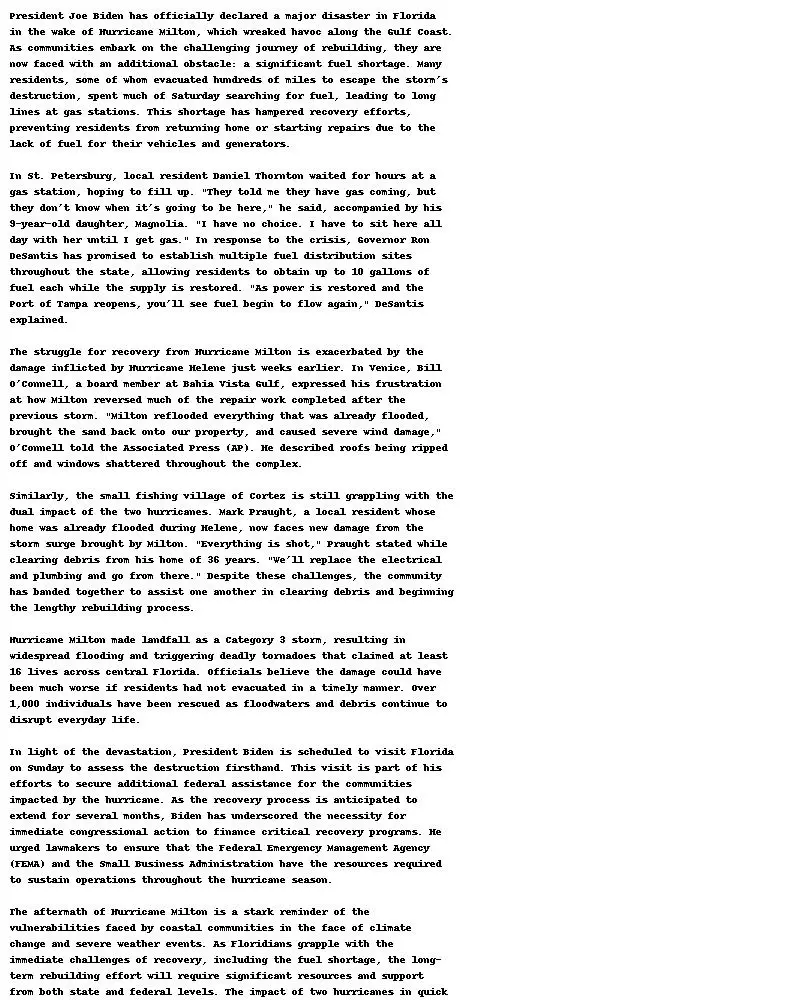President Joe Biden has officially declared a major disaster in Florida in the wake of Hurricane Milton, which wreaked havoc along the Gulf Coast. As communities embark on the challenging journey of rebuilding, they are now faced with an additional obstacle: a significant fuel shortage. Many residents, some of whom evacuated hundreds of miles to escape the storm’s destruction, spent much of Saturday searching for fuel, leading to long lines at gas stations. This shortage has hampered recovery efforts, preventing residents from returning home or starting repairs due to the lack of fuel for their vehicles and generators.
In St. Petersburg, local resident Daniel Thornton waited for hours at a gas station, hoping to fill up. “They told me they have gas coming, but they don’t know when it’s going to be here,” he said, accompanied by his 9-year-old daughter, Magnolia. “I have no choice. I have to sit here all day with her until I get gas.” In response to the crisis, Governor Ron DeSantis has promised to establish multiple fuel distribution sites throughout the state, allowing residents to obtain up to 10 gallons of fuel each while the supply is restored. “As power is restored and the Port of Tampa reopens, you’ll see fuel begin to flow again,” DeSantis explained.
Double Devastation
The struggle for recovery from Hurricane Milton is exacerbated by the damage inflicted by Hurricane Helene just weeks earlier. In Venice, Bill O’Connell, a board member at Bahia Vista Gulf, expressed his frustration at how Milton reversed much of the repair work completed after the previous storm. “Milton reflooded everything that was already flooded, brought the sand back onto our property, and caused severe wind damage,” O’Connell told the Associated Press (AP). He described roofs being ripped off and windows shattered throughout the complex.
Similarly, the small fishing village of Cortez is still grappling with the dual impact of the two hurricanes. Mark Praught, a local resident whose home was already flooded during Helene, now faces new damage from the storm surge brought by Milton. “Everything is shot,” Praught stated while clearing debris from his home of 36 years. “We’ll replace the electrical and plumbing and go from there.” Despite these challenges, the community has banded together to assist one another in clearing debris and beginning the lengthy rebuilding process.
A Deadly Storm and the Road Ahead
Hurricane Milton made landfall as a Category 3 storm, resulting in widespread flooding and triggering deadly tornadoes that claimed at least 16 lives across central Florida. Officials believe the damage could have been much worse if residents had not evacuated in a timely manner. Over 1,000 individuals have been rescued as floodwaters and debris continue to disrupt everyday life.
In light of the devastation, President Biden is scheduled to visit Florida on Sunday to assess the destruction firsthand. This visit is part of his efforts to secure additional federal assistance for the communities impacted by the hurricane. As the recovery process is anticipated to extend for several months, Biden has underscored the necessity for immediate congressional action to finance critical recovery programs. He urged lawmakers to ensure that the Federal Emergency Management Agency (FEMA) and the Small Business Administration have the resources required to sustain operations throughout the hurricane season.
The aftermath of Hurricane Milton is a stark reminder of the vulnerabilities faced by coastal communities in the face of climate change and severe weather events. As Floridians grapple with the immediate challenges of recovery, including the fuel shortage, the long-term rebuilding effort will require significant resources and support from both state and federal levels. The impact of two hurricanes in quick succession has strained local resources, and the resilience of these communities will be tested as they navigate the difficult road ahead.
Local businesses and residents alike are mobilizing to assist one another, recognizing that recovery will necessitate a collective effort. The spirit of solidarity is palpable as people share resources, provide shelter, and offer emotional support to those affected by the storms. Many local organizations and volunteers are stepping up to help distribute food, water, and essential supplies to those in need, demonstrating the strength of community ties in the face of adversity.
As recovery efforts ramp up, attention will also turn to the necessary infrastructure improvements to better withstand future storms. Discussions regarding building codes, coastal defenses, and emergency response systems are likely to take center stage as officials and residents alike seek to learn from this latest disaster. It is crucial for lawmakers and community leaders to prioritize funding for these initiatives to enhance resilience against the increasing frequency and severity of hurricanes.
In conclusion, the devastation wrought by Hurricane Milton, compounded by the previous impact of Hurricane Helene, has left Florida grappling with significant challenges in recovery. The fuel shortage complicates efforts to rebuild, and the loss of life underscores the urgency of effective disaster response and recovery measures. As President Biden prepares to visit the state, the focus remains on securing necessary federal aid and ensuring that affected communities receive the support they need to rebuild and recover from this catastrophic event.


